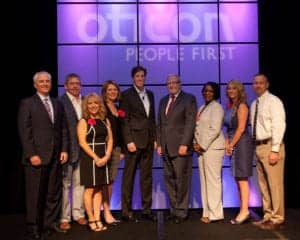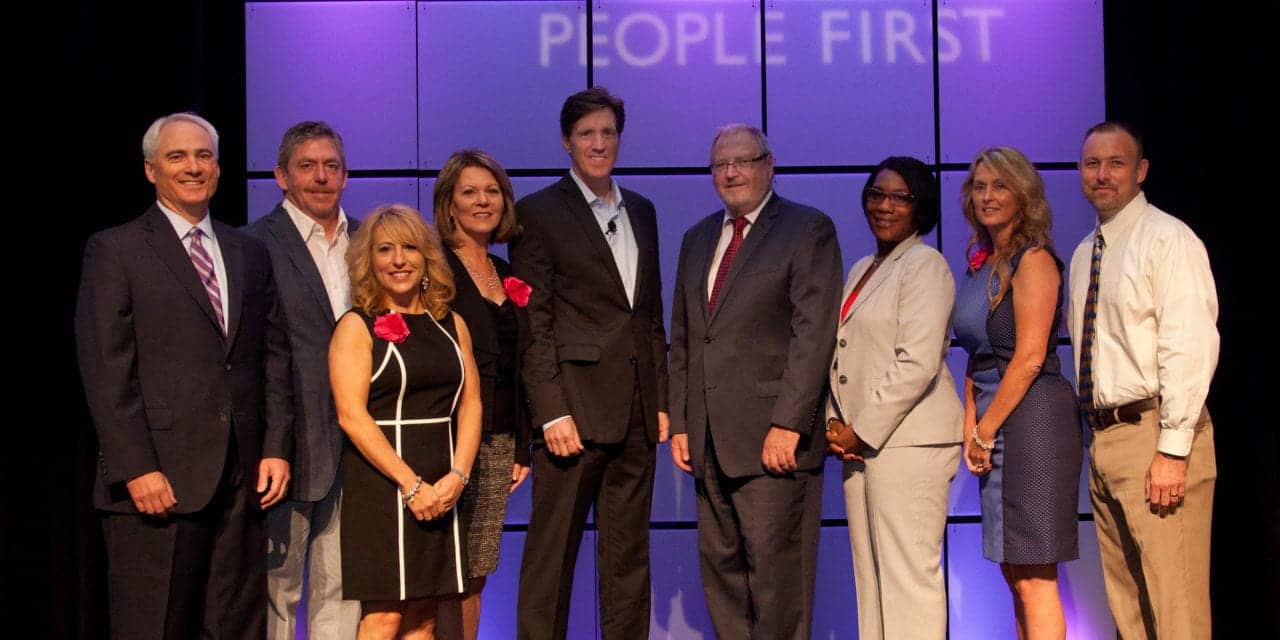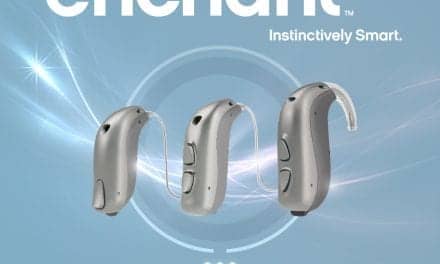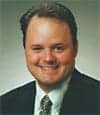
Left to right: Jim Kothe, MS, Oticon VP of Sales; Don Schum, PhD, VP of Audiology & Professional Relations; Nancy Palmere, Senior Marketing Manager; Marija Baranauskas, AuD, Director of Education and Training; behavioral scientist James Kane, keynote speaker; Oticon President Peer Lauritsen; Sheena Oliver, VP of Marketing and Mike Irby, Manager of Business Development.
More than 500 US hearing care professionals attended the 2014 Human Link Conference, “Hearing Care is Health Care,” hosted by Oticon Inc, Somerset, NJ. The professional knowledge-sharing event, held in two sessions on the east and west coasts, discussed the growing body of research showing the connection between hearing health and brain health. The full agenda of presentations and workshops explored the importance of hearing in maintaining cognitive function and looked at the newest innovations in hearing care, including Oticon’s BrainHearing™ technology.
“Patients live in a world where cognition, attention, memory, and hearing each play critical roles in listening,” said Oticon President Peer Lauritsen. “With the latest information on the connection between hearing loss and healthy aging, we see an enormous opportunity for practitioners to help patients understand that hearing loss is a serious health care issue— and to motivate them to take action.”
Don Schum, PhD, VP of Audiology & Professional Relations for Oticon, opened the conferences with an in-depth review of the state of research on hearing and brain health, examining the relationships between hearing, cognition, dementia/Alzheimer’s and hearing device use. He shared strategies for opening communication with consumers to help them understand that speech understanding and comprehension are cognitive processes that happen in the brain.
Keynote speaker and behavioral scientist James Kane invited participants to look more closely at how the brain operates to better appreciate the ways in which loyal patient relationships are built and maintained. Supported by more than 40 years of Harvard University research, Kane made the case that human beings have a fundamental need to be loyal and shared loyalty-building behaviors practitioners can use to develop lasting relationships with patients.
A series of interactive workshops focused on new knowledge and solutions for attracting first time users, as well as new Oticon tools designed to improve marketing efficiency and productivity. Participants were also introduced to BrainHearing, Oticon’s “brain first” technology that the company says is designed to help provide better hearing with less effort by giving the brain the clearest, purest sound signals to decode. The benefits of the technology were showcased in Oticon’s newest ultra-compact wireless solutions that combine discreet aesthetics, comfort, and excellent performance with reduced listening effort for a high level of patient satisfaction, according to the company.
For more information about Oticon’s “brain first” approach, BrainHearing™ technology and new designRITE and custom solutions, visit: http://www.pro.oticonusa.com





